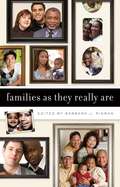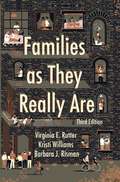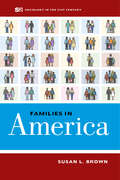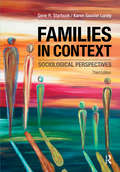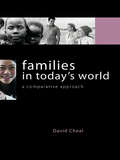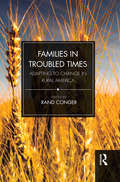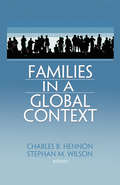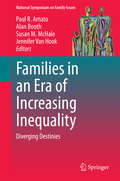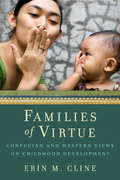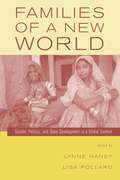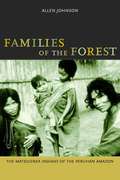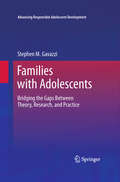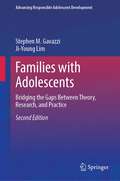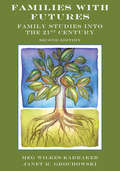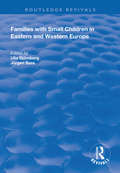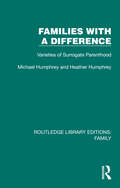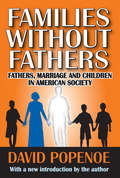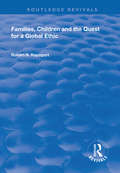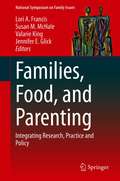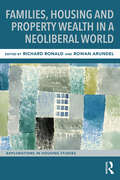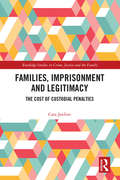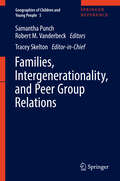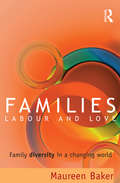- Table View
- List View
Families as They Really Are
by Barbara J. RismanFor students and general readers, Risman (U. of Illinois at Chicago) brings together 40 essays by members of the Council on Contemporary Families, an interdisciplinary community of historians, social scientists, and other experts who study and work with families, on how families operate in everyday life, how they got to where they are today, research on the topic, families and relationships in the twenty-first century, youth and social class in the twenty-first century, and the impact of the gender revolution. They incorporate new articles with the Council's Briefing Papers, press releases, and newspaper articles based on them and provide information meant to lead to better social policy. Topics include differences in childhood over the last three centuries, how professional African Americans pioneered the modern marriage, sex, cohabitation, same-sex marriage, interracial marriage, parenting, divorce, immigrant families, child care, children's poverty, men's contributions to the household, and gendered violence.
Families as They Really Are (Third Edition)
by Barbara J RismanThis purchase offers access to the digital ebook only.
Families in America
by Susan L. BrownIn this accessible, engaging, and up-to-date course book, Susan L. Brown employs ethnographic vignettes and demographic data to introduce students to twenty-first century perspectives on contemporary families. Appropriate as a primary or secondary text in classes on family and marriage, this book probes momentous shifts in the definition of family, such as the legalization of same-sex marriage and policy debates on welfare reform and work-family issues. Brown also explores the rise in nonmarital childbearing and single-mother families and the decline of “traditional” marriage by delving into the historical roots of family change, current trends of family formation and dissolution, and the implications of family change for the well-being of adults and children. With a lens toward socioeconomic inequality and racial-ethnic variation in family patterns, Families in America illustrates how family diversity is now the norm. The Sociology in the Twenty-First Century series introduces students to a range of sociological issues of broad interest in the United States today, with each volume addressing topics such as family, race, immigration, gender, education, and social inequality. These books—intended for classroom use—will highlight findings from current, rigorous research and demographic data while including stories about people’s experiences to illustrate major themes in an accessible manner. Learn more at www.ucpress.edu/go/sociologyinthe21stcentury.
Families in Context: Sociological Perspectives
by Gene H. Starbuck Karen Saucier LundyThe most thoroughly updated edition yet, this book offers students perspectives of changes in marriage and family over time, including the impact of the Great Recession and of new media technologies. A hallmark of Families in Context remains the well-researched, data-driven quality of the text. Beyond presenting thoroughly updated statistics and literature, each chapter examines new trends and assesses their implications for students' lives. The underlying presentation remains balanced, theoretically grounded, and accessible to a wide variety of classes, allowing students of all ages and family backgrounds to draw their own conclusions about controversial topics. Features of the new edition include coverage of the Affordable Care Act; new social media and families; the latest trends in poverty, education, social mobility, gender, identities and healthcare; updated 'In the News' features and author-created PowerPoint slides.
Families in Focus: New Perspectives on Mothers, Fathers, and Children
by Judith Bruce Cynthia Lloyd Ann LeonardThis Population Council Report shows that, in rich and poor countries alike, parent-child bonds are unraveling and that women carry much more significant economic and social responsibilities for the family than commonly believed. The authors of this book urge policymakers and researchers to focus on strengthening parent-child ties and to look beyond the myth that all families are stable and cohesive units in which the father serves as economic provider, the mother serves as emotional caregiver, and all children are treated equally well.
Families in Today's World: A Comparative Approach
by David ChealAn international textbook designed as a quick introduction for students from around the world studying sociology of family, this text provides comprehensive coverage of the major topics in the sociology of family life. Written in an easy access style it opens with a chapter on defining family and family structures. It then moves on to discuss over a dozen major topics; from interaction and meaning in families to sexuality. David Cheal provides coverage of these topics by drawing on a variety of international material. Most of the studies focus on contemporary family life but Cheal also presents information on historical changes which have shaped family life as it is known today. This book an incredibly valuable teaching tool as it presents diversity in family patterns through thinking about family life from a global perspective.
Families in Troubled Times: Adapting to Change in Rural America (Social Institutions And Social Change Ser.)
by Rand CongerThis book documents the experiences of rural Iowa families, who lived through the "farm crisis" years of the 1980s, in a fashion that might help families of the future cope more successfully with economic reversals. The documentation could be used to fashion more effective social policies.
Families in a Global Context
by Charles B. Hennon and Stephan M. WilsonLearn what trends and factors are influencing families globally How are families the same or different around the world? Families in a Global Context puts the similarities and differences into perspective, presenting an in-depth comparative analysis of family life in 17 countries around the world. Contributors discuss different countries' family life by using a standard framework to review major influences and patterns. The framework allows readers to do comparative reflection across several countries on a variety of daily living elements, including social and economic forces such as urbanization and modernization, changes in gender/courtship/spousal patterns, and war. This book provides an informative illustration of current as well as future trends of family life worldwide. Each chapter in Families in a Global Context describes customary types of family patterns within each country’s social organization and culture. Important social, economic, political, and other trends are explored in detail, and major ethnic, religious, or other subcultures are noted emphasizing marriage and family patterns that differ from the more typical ones. The book is extensively referenced and includes tables to clearly present data. Countries explored in Families in a Global Context include: European countries of Wales, Sweden, Germany, Romania, and Italy African countries of Sierra Leone, South Africa, and Kenya Middle Eastern countries of Turkey and Iran Asian and Oceanian countries of India, China, the Philippines, and Australia Latin American countries of Brazil, Mexico, and Cuba Topics discussed for each country in Families in a Global Context include: demographics mate selection patterns with an emphasis on the dynamics of couple formation marital roles the place and role of children and parenting in families socialization for gender roles differences in education, employment, and other opportunities major stressors affecting families, coping, and adaptation aging and life expectancy issues and much more! Families in a Global Context is an insightful resource for researchers, educators, and advanced undergraduate and graduate students investigating comparative family topics of family life around the world and in cultural context.
Families in an Era of Increasing Inequality
by Alan Booth Susan M. Mchale Paul R. Amato Jennifer Van HookThe widening gap between the rich and the poor is turning the American dream into an impossibility for many, particularly children and families. And as the children of low-income families grow to adulthood, they have less access to opportunities and resources than their higher-income peers--and increasing odds of repeating the experiences of their parents. Families in an Era of Increasing Inequality probes the complex relations between social inequality and child development and examines possibilities for disrupting these ongoing patterns. Experts across the social sciences track trends in marriage, divorce, employment, and family structure across socioeconomic strata in the U. S. and other developed countries. These family data give readers a deeper understanding of how social class shapes children's paths to adulthood and how those paths continue to diverge over time and into future generations. In addition, contributors critique current policies and programs that have been created to reduce disparities and offer suggestions for more effective alternatives. Among the topics covered: Inequality begins at home: the role of parenting in the diverging destinies of rich and poor children. Inequality begins outside the home: putting parental educational investments into context. How class and family structure impact the transition to adulthood. Dealing with the consequences of changes in family composition. Dynamic models of poverty-related adversity and child outcomes. The diverging destinies of children and what it means for children's lives. As new initiatives are sought to improve the lives of families and children in the short and long term, Families in an Era of Increasing Inequality is a key resource for researchers and practitioners in family studies, social work, health, education, sociology, demography, and psychology.
Families of Virtue
by Erin M. ClineFamilies of Virtue reads a range of thinkers and scientists, from ancient Greek and Chinese philosophers to contemporary feminist ethicists and attachment theorists, to articulate the critical role of the parent-child relationship in the moral development of infants and children. Arguing that philosophy can support our best empirical findings to shape effective policy, this book seeks to strengthen families, help raise happier children, and successfully address current moral problems.Early Confucian philosophers argue that the general ethical sensibilities we develop during infancy and early childhood form the basis for nearly every virtue and that the parent-child relationship is the primary context within which this growth occurs. Joining these views with scientific work on early childhood, the text shows how an extensive body of research in Western psychology can bolster and renew the theoretical underpinnings of Confucian thought. Confucian philosophers can therefore help promote positive social and political change in our time, particularly in such surprising areas as paid parental leave, breastfeeding initiatives, marriage counseling, and family therapy.
Families of Virtue: Confucian and Western Views on Childhood Development
by Erin ClineFamilies of Virtue articulates the critical role of the parent–child relationship in the moral development of infants and children. Building on thinkers and scientists across time and disciplines, from ancient Greek and Chinese philosophers to contemporary feminist ethicists and attachment theorists, this book takes an effective approach for strengthening families and the character of children.Early Confucian philosophers argue that the general ethical sensibilities we develop during infancy and early childhood form the basis for nearly every virtue and that the parent–child relationship is the primary context within which this growth occurs. Joining these views with scientific work on early childhood, Families of Virtue shows how Western psychology can reinforce and renew the theoretical underpinnings of Confucian thought and how Confucian philosophers can affect positive social and political change in our time, particularly in such areas as paid parental leave, breastfeeding initiatives, marriage counseling, and family therapy.
Families of a New World: Gender, Politics, and State Development in a Global Context
by Lynne Haney Lisa PollardFirst published in 2003. Routledge is an imprint of Taylor & Francis, an informa company.
Families of the Forest: The Matsigenka Indians of the Peruvian Amazon
by Allen W. JohnsonAn ethnographic account of how and why a native American people live in autonomous, self-sufficient family groups along the Amazon fringe in the foothills of the Peruvian Andes.
Families with Adolescents
by Stephen GavazziThis book focuses a unique panoramic lens on the study of adolescent development. It offers a clear blueprint for more consistently improved practice, emphasizing family process and structure instead of individual developmental stages.
Families with Adolescents: Bridging the Gaps Between Theory, Research, and Practice (Advancing Responsible Adolescent Development)
by Stephen M. Gavazzi Ji-Young LimThe second edition of this book offers an expanded and updated blueprint for more consistently improved practice, emphasizing family process and structure instead of only individual developmental stages. Its chapters deftly summarize the recent knowledge base about families with adolescents and explains how to apply these results across mental health and social services disciplines. The new edition clearly illustrates family concerns and theoretical perspectives through real-world vignettes and cogent use of family assessment measures. Chapters offer a broad understanding of how diversity in all its forms – including race/ethnicity, culture, religion, and sexual orientation – has created a much more nuanced understanding of how families with adolescents are able to function within their environment. Both major challenges to families and communities form the backdrop of the second edition’s focus on forecasting in which the theoretical, empirical, and intervention literatures necessarily move in service to the health and well-being of families with adolescents.Featured topics include: Central concepts of family development, family systems, ecological, attachment, and social learning theories in relation to families with adolescents. Influence of the family on adolescent problem behavior, mental health concerns, substance use issues, educational attainment, and social competence outcomes. Selected studies on parenting behaviors, conflict resolution, and other major aspects of families with adolescents. Application topics in family-based intervention and prevention programs. Integrating theory, research, and applications to create a “triple threat” model. Diversity issues surrounding race/ethnicity, culture, religion, and sexual orientation. Families with Adolescents, Second Edition, is an essential resource for researchers, professors, and graduate and advanced undergraduate students as well as professionals and other mental health clinicians, practitioners, and therapists in clinical child and developmental psychology, family studies, human development, sociology, social work, education, and all allied disciplines.
Families with Futures: Family Studies into the 21st Century, Second Edition
by Janet R. Grochowski Meg Wilkes KarrakerNoted for its interdisciplinary approach to family studies, Families with Futures provides an engaging, contemporary look at the discipline's theories, methods, essential topics, and career opportunities. Featuring strong coverage of theories and methods, readers explore family concepts and processes through a positive prism. Concepts are brought to life through striking examples from everyday family life and cutting-edge scholarship. Throughout, families are viewed as challenged but resilient. Each chapter opens with a preview of the chapter content and concludes with key terms and varied learning activities that promote critical thinking. The activities include provocative questions and exercises, projects, and interactive web activities. Boxes feature authentic voices from scholars and practitioners (including CFLEs) from a variety of disciplines including family studies, sociology, psychology, and more. These boxes provide a firsthand look at what it is like to work in the field. The book concludes with a glossary defining each chapter's boldfaced key terms.Updated throughout, the new edition features new coverage of: The latest family theories including feminist theory and postmodernism Immigrant and transnational families in the 21st century Physiology, psychology, and sociology of intimacy and sexuality Effects of recent health and other policy decisions on families Care giving in families, especially in later life Family finances, with an emphasis on the recent economic downturns Career opportunities in family studies. The new Instructor's Resource website features test questions, PowerPoint slides, chapter outlines, news bulletins of current events, hotlinks to helpful tools such as the NCFR's Ethical Principles and Guidelines, and more. This is an ideal text for upper-level undergraduate and lower-level graduate courses in family studies, family ecology, and family science offered in departments of family and consumer sciences, human development, psychology, and sociology.
Families with Small Children in Eastern and Western Europe (Routledge Revivals)
by Ulla Björnberg Jürgen SassPublished in 1997, the aim of this study is to address comparative perspectives on gender and family life in western and eastern Europe. The focus is on the way in which family policy measures relating to the reconciliation of work and family are viewed and used by employed parents with small children. Another purpose is to consider how compatibility between family and employment is perceived by the parents, and its implications for partnership, gender balance, and parent-child relationships. The book also discusses the consequences and lessons which can be drawn from these studies for the purpose of family policy initiatives.
Families with a Difference: Varieties of Surrogate Parenthood (Routledge Library Editions: Family)
by Michael Humphrey Heather HumphreyIn the 1980s families other than those made up of the natural mother, father, and siblings were increasing in number. Originally published in 1988, this book looks at these ‘alternative’ families and considers the psychological and social consequences of growing up in a family where the genetic link between parents and children is missing or incomplete. The authors discuss adoption, fostering, stepfamilies, and parenthood by donor insemination, as well as such areas as ‘womb-leasing’ and homosexual parenthood, considered controversial at the time. A recurring theme is whether, when, and what to tell children of their extrafamilial origins, and how they and other family members react to the knowledge. Families with a Difference is a comprehensive new analysis of the changing nature of family life in western society which, in the aftermath of the influential Warnock Report in 1984, would have been important reading for students and professionals in social policy, social work, psychology, and the social aspects of medicine.
Families without Fathers: Fatherhood, Marriage and Children in American Society
by David PopenoeThe American family is changing. Divorce, single parents, and stepfamilies are redefi ning the ways we live together and raise our children. Many "experts" feel these seemingly inevitable changes should be celebrated; they claim that the "new" families, which often lack a strong father, are actually healthier than traditional two-parent families—or, at the very least, do children no harm. But as David Popenoe shows in Families Without Fathers this optimistic view is severely misguided. Examining evidence from social and behavioral science, history, and evolutionary biology, Popenoe shows why fathers today are deserting their families in record numbers. The disintegration of the child-centered, two parent family—especially in the inner cities, where as many as two in three children are growing up without their fathers—and the weakening commitment of fathers to their children that more and more follows divorce, are central causes of many of our worst individual and social problems. Juvenile delinquency, drug and alcohol abuse, teenage pregnancy, welfare dependency, and child poverty can be directly traced to fathers' lack of involvement in their children's lives. Our situation will only get worse, Popenoe warns, unless men are willing to renew their commitment to their marriages and to their children. Yet he is not just an alarmist. He suggests concrete policies, and new ways of thinking and acting that will help all fathers improve their marriages and family lives, and tells us what we as individuals and as a society can do to support and strengthen the most important thing a man can do.
Families, Children and the Quest for a Global Ethic (Routledge Revivals)
by Robert N. RapoportPublished in 1997, this volume looks at the role of families in the world order and the problems facing them especially in the face of globalization. The author takes into account materialist, religious, gender and environmental concerns.
Families, Food, and Parenting: Integrating Research, Practice and Policy (National Symposium on Family Issues #11)
by Valarie King Susan M. McHale Jennifer E. Glick Lori A. FrancisThis book examines the many roles of families in their members’ food access, preferences, and consumption. It provides an overview of factors – from micro- to macro-levels – that have been linked to food insecurity and discusses policy approaches to reducing food insecurity and hunger. In addition, it addresses the links between food insecurity and overweight and obesity. The book describes changes in the U.S. food environment that may explain increases in obesity during recent decades. It explores relationships between parenting practices and the development of eating behaviors in children, highlighting the importance of family mealtimes in healthful eating. The volume provides an overview of efforts to prevent or reduce obesity in children, with attention to minority populations and discusses research findings on targets for obesity prevention, including a focus on fathers as change agents who play a crucial, yet understudied, role in food parenting. The book acknowledges that with the current obesigenic environment in the United States and elsewhere around the world, additional and innovative efforts are needed to foster healthful eating behavior and orientations toward food in childhood and in families. This book is a must-have resource for researchers, professors, clinicians, professionals, and graduate students in developmental psychology, family studies, public health as well as numerous interrelated disciplines, including sociology, demography, social work, prevention science, educational policy, political science, and economics.
Families, Housing and Property Wealth in a Neoliberal World (Explorations in Housing Studies)
by Richard Ronald Rowan ArundelThe twenty-first century has so far been characterized by ongoing realignments in the organization of the economy around housing and real estate. Markets have boomed and bust and boomed again with residential property increasingly a focus of wealth accumulation practices. While analyses have largely focussed on global flows of capital and large institutions, families have served as critical actors. Housing properties are family goods that shape how members interact, organise themselves, and deal with the vicissitudes of everyday economic life. Families have, moreover, increasingly mobilized around their homes as assets, aligning household transitions and practices towards the accumulation of property wealth. The capacities of different families to realise this, however, are highly uneven with housing conditions becoming increasingly central to growing inequalities and processes of social stratification. This book addresses changing relationships between families and their homes over the latest period of neo-liberalization. The book confronts how transformations in households, life-course transitions, kinship and intergenerational relations shape, and are being shaped by, the shifting role of property markets in social and economic processes. The chapters explore this in terms of different aspects of home, family life and socioeconomic change across varied national contexts.
Families, Imprisonment and Legitimacy: The Cost of Custodial Penalties (Routledge Studies in Crime, Justice and the Family)
by Cara JardineThis book examines what it means to be a family within the restrictive, disruptive, and often distressing context of imprisonment. Drawing on original qualitative data, it looks beyond traditional models of the family to examine the question of which relationships matter to individuals affected by imprisonment, and demonstrates how family relationships are actively constructed and maintained through family "practices" and "displays" such as visits, shared experiences and continuing family memories and traditions. It sheds new light not only on the true extent of who is impacted by the imposition of a prison sentence, but also the barriers to family life that these individuals encounter throughout its duration.This book also contributes to our understanding of wider issues such as poverty and social marginalisation, the role of family relationships on desistance from crime, and legitimacy. It argues that the act of supporting an individual in custody can bring families into regular contact with the criminal justice system in ways that can be both distressing and problematic, and therefore contends that the prison system should minimise the damage caused by imprisonment not only to family relationships, but also to the perceived legitimacy of the criminal justice system.Generating new conceptual insights into the harms of imprisonment and how perceptions of legitimacy and fairness are shaped by the criminal justice system, this book will be of much interest to students of criminology and sociology engaged in studies of criminal justice, prisons, gender, social work, and punishment. It will also be of interest to policy makers, penal-reformers, and activists.
Families, Intergenerationality, and Peer Group Relations
by Tracey Skelton Samantha Punch Robert M. VanderbeckThis volume addresses children and young people’s relationships both within and beyond the context of the family. It begins with familial relationships and the home by examining the social and cultural complexities of families, intimacies and interdependencies, including the dynamics of families as spatial units (nuclear, multi-generational, alternative) and the roles that children play (as carers etc.). In addition to considering child/parent relations, sibling relationships and birth order, the initial section includes particular dimensions of children's familial relationships in diverse contexts, such as family food practices, aspirations and work practices. The second section explores geographical dimensions of adult/child relationships beyond the dynamics of the family and across the lifecourse. It considers the roles that intergenerationality plays in children's and young people's lives as well as their links with wider communities. The section addresses broader conceptual issues and themes (child-adult relationships outside the home; intergenerational geographies and spaces; and the intergenerational city) while also providing more focused discussions of current issues related to the geographies of intergenerationality including adoption, looked after children and fertility. The final section addresses children and young people's relationships with one another: friendship, peer group relations, and sexualities. It explores the geographies and spatialities of affective relations and emotional practices among children and young people. Geographies of bodies and embodiment and their connection to identities is an important part of this section. The chapters range from cross-cultural comparisons of age mixing among children to specific kinds of relationship formations between children and young people (e.g. friendship; sexual relations; gangs; bullying) and the spaces and places (including cyberspace) that facilitate, impede and organise these relationships. The diverse relationships that children and young people form with both one another and with adults have significant geographical dimensions.
Families, Labour and Love: Family diversity in a changing world
by Maureen BakerWe think of our family life as very personal, but in fact it is shaped by influences well beyond our control. Families, Labour and Love identifies the ways in which family and personal life in three 'settler' societies - Australia, New Zealand and Canada - has been shaped by colonisation, immigration, globalisation, demographic changes, law and policy.Baker shows that these three countries, each a former colony, developed similar family trends and similar family policies. Strongly gendered patterns of paid and unpaid work played a major role in family life. The family practices of indigenous people were largely overlooked, as were those of recent immigrant groups. However local conditions also produced significant differences in family experiences among the three countries.Richly illustrated with examples, comparative data and textual sources, Families, Labour and Love provides a broad-ranging analysis of the family which will appeal to students, researchers and policy-makers.Maureen Baker outlines with great clarity the diversity of families and the way in which they are shaped by historical and cultural forces. The focus on Australia, New Zealand and Canada is not only refreshing but throws into sharp relief the impact on contemporary families of the colonial experience, industrialisation, large scale immigration and globalisation.David de Vaus, La Trobe University
